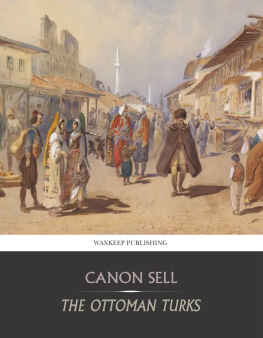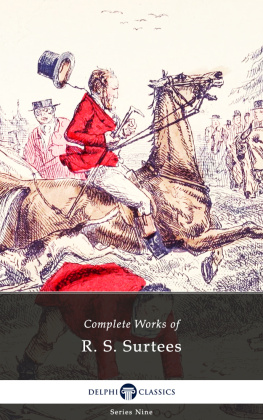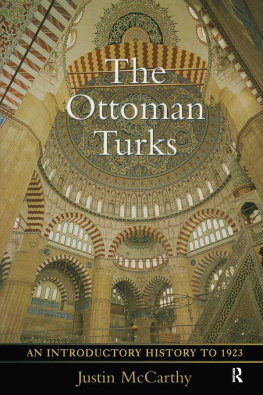STANHOPE PRIZE ESSAY1859.
THE
CAUSES OF THE SUCCESSES
OF THE
OTTOMAN TURKS.
BY
JAMES SURTEES PHILLPOTTS,
SCHOLAR OF NEW COLLEGE.
OXFORD:
T. and G. SHRIMPTON.
M DCCC LIX.
THE CAUSES OF THE SUCCESSES OF THE OTTOMAN TURKS.
By the fall of the Seljukian dynasty in Asia Minor, a vast number of Turks, scattered over the fertile tracts of Western Asia, were left without any organized government. The Emirs of the Seljouks in their different districts tried to set up separate kingdoms for themselves, but their power was successfully exercised only in making depredations upon each other. For some time they were under the sway of the Khans of Persia, but the decline of the Mogul Empire after the death of Cazan, freed them from this control; nor had the energy and restless activity of their race yet begun to fail. They were all united by the affinity of race, as well as by their language, and by the common bond of the Sunnite creed. In return for Ertogruhls services in war Alaeddin gave him a grant of territory in the highlands of Phrygia. The warlike spirit of Ertogruhls son Othman, raised him to the rank of an independent chieftain, and he soon made himself master of strong positions on the borders of the Greek Empire. With ill-judged parsimony, the Emperor Michael had disbanded the militia, who guarded the passes of Mount Olympus, and had thus left Bithynia open to attack. Orchan, the son of Othman, took advantage of these favourable occurrences, enlarged his territory at the expense of the Greeks, and by uniting several of the scattered Turkish tribes under one head, laid the foundation of the Ottoman Empire.
Thus the circumstances of the times were throughout eminently favourable to the Ottomans. The fall of the Seljouk monarchy, and the consequent diffusion of the Turkish population, had given free scope to their enterprising spirit. Through the civil wars of the Byzantine Emperors and the disputes of the Venetians and Genoese, they were enabled to gain their first footing in Europe. Had Amuraths attempt to extend his kingdom over the Christian nations of Thrace and Roumelia been made in the 11th century, he would have roused all Europe in common resistance to his rising power. But in 1388, the Servian confederacy could obtain no aid from Western Christendom. As long as Richard II. was king of England, and Charles VI. of Francewhile Germany was ruled by the dissolute WinceslausAmurath had little to fear from the powers of the West. Spain was too much occupied by her wars with the Moslems at home to think of the sufferings of her Christian brethren in the East. Nor was there any danger that the rival popes of Avignon and Rome would forget their private animosities to assist in arresting the fall of a distant and schismatical church.
At the crowning point of their success, the siege of Constantinople by Mahomet II., the advantages of time were again on the side of the Ottomans. The Roman pontiff, furious at their obstinacy in refusing to join the communion of the Latin church, had conceived an aversion for the Greeks which could hardly be exceeded by any abhorrence of the Mnssulmans creed. It might have been expected that he would rouse himself to prevent the destruction of the Eastern defences of Christendom, but he chose rather a selfish and inglorious part, content to foresee and even to foretell the coming overthrow of the Greek Empire. Thus did the Patriarch of the West, the natural head of any confederacy for the succour of Constantinople, look on at its fall with seeming unconcern. Meanwhile the English and the French were engaged in a quarrel too deadly to be reconciled. The Germans would not join with the Hungarians, nor would the Spanish have any concert with the Genoese. In short no coalition of the powers of Europe was possible. Even the Greeks themselves were too much divided by religious dissensions to offer united resistance to their Moslem foe, and their want of union could only be equalled by their cowardice. The valour of the last Constantine did indeed shed glory over his own particular fate, but the issue of the struggle could not be doubtful when the disciplined troops and the famed artillery of the Turk were opposed to the feeble and disunited force of the enervated Byzantines.
These external circumstances are important, as having been auxiliary to the rise of the Ottomans. But the main causes of their success must be sought in the wisdom of their rulers and in the institutions which they established.
Their government was most singularly constituted, and of a character totally dissimilar to any of the governments of Christendom. The institutions too from which they derived their solid and lasting power were for the most part peculiar to themselves. On these institutions the stability of the Ottoman greatness mainly rested. With their first appearance it arose; with their gradual development it had grown; as they were neglected and fell into disuse, the ancient glory of the Crescent was dimmed, obscured, and finally extinguished.
Even in the legendary history of the founder of their nation is shadowed forth the faint outline of their peculiar, policy. By patient waiting till he attained his purpose, Othman won his wife from an alien tribe. His expeditions were sanctioned by the blessing of the Holy Scheik Edebali. From the fruit of these expeditions, from the Christian captives who were condemned to slavery, was selected the wife of his son Orchan. A Christian apostate, Michael of the Pointed Beard was the chief of Othmans captains.
It was from the example of their founder, they would have us believe, that they adopted customs of receiving renegades, of foreign intermarriage, a warlike zeal sanctioned by religion, a system of slavery-institutions which in later times were the distinguishing characteristics of their race. It matters not if these accounts of Othmans early history be the invention of later times; this rather shows (since fiction is more philosophical than truth), that the Ottomans themselves were convinced that it was mainly on the preservation of these usages that their greatness rested. It was, however, reserved for the sons of Othman to set the system on a permanent basis, and to the legislative genius of Alaeddin in the succeeding reign, was chiefly due the stability of the Ottoman race.
In general the Asiatic dynasties culminate to their height of power with a marvellous rapidity, and then, dependent solely on the merits of their rulers, with no institutions calculated to ensure any lasting greatness, fall by a decline no less rapid and less marvellous than their rise. The career of Ottoman conquest lacked the dazzling grandeur which invests the exploits of Genghis Khan, or Timour, but it was not destined to be as ephemeral as they. In its slow and cautious advance, in the gradual organization of conquered provinces, in the unswerving patience which waited always for the fittest opportunity, it bore no faint resemblance to the stately march of Roman sovereignty.
The close of Othmans life of seventy years saw him but just made possessor of a single city of importance. It was not till the reign of Orchan that the Ottomans ceased to acknowledge the sovereignty of the Iconian Sultans, and first adopted a coinage of their own. The wise policy of Orchans coadjutor, Alaeddin, gave them a respite from war for twenty years, in which time he consolidated the small kingdom they had already won, and perfected a system which was to be the instrument of future conquest.
It was during this period of tranquillity that the organization of the army was effectedan organization which, possessing in itself the various merits of the most invincible forces that have ever been collectedthe asceticism and brotherhood of the Spartan companies, the mixture of races in the army of Hannibal, the religious zeal of the English Puritans, and the devotion of Caesars 10th legionadded to all these, two peculiarities of their creed, the absolute subjection of every individual to the sacred authority of the Sultan, and the warlike inspirations of a religion that taught them that in the conflict of the crossing scymetars Paradise was to be won.










